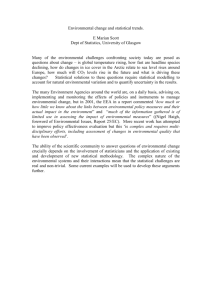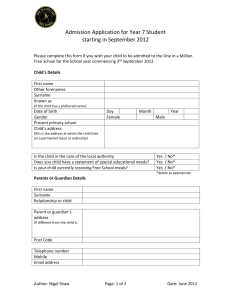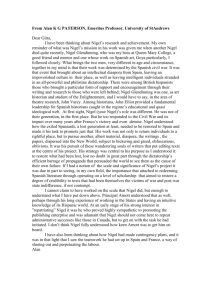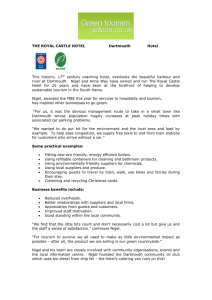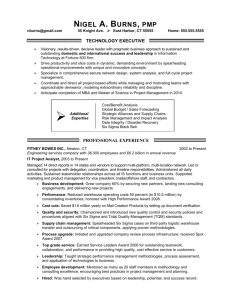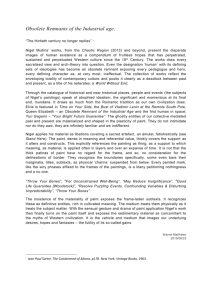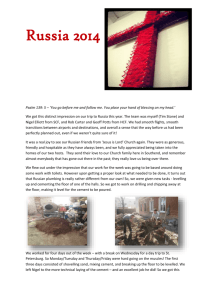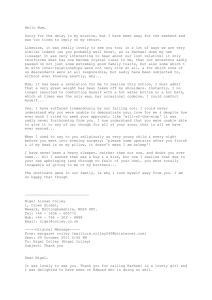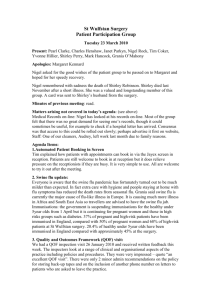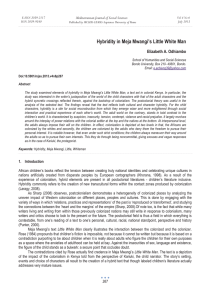Tribute from a school friend, Martin Dinham
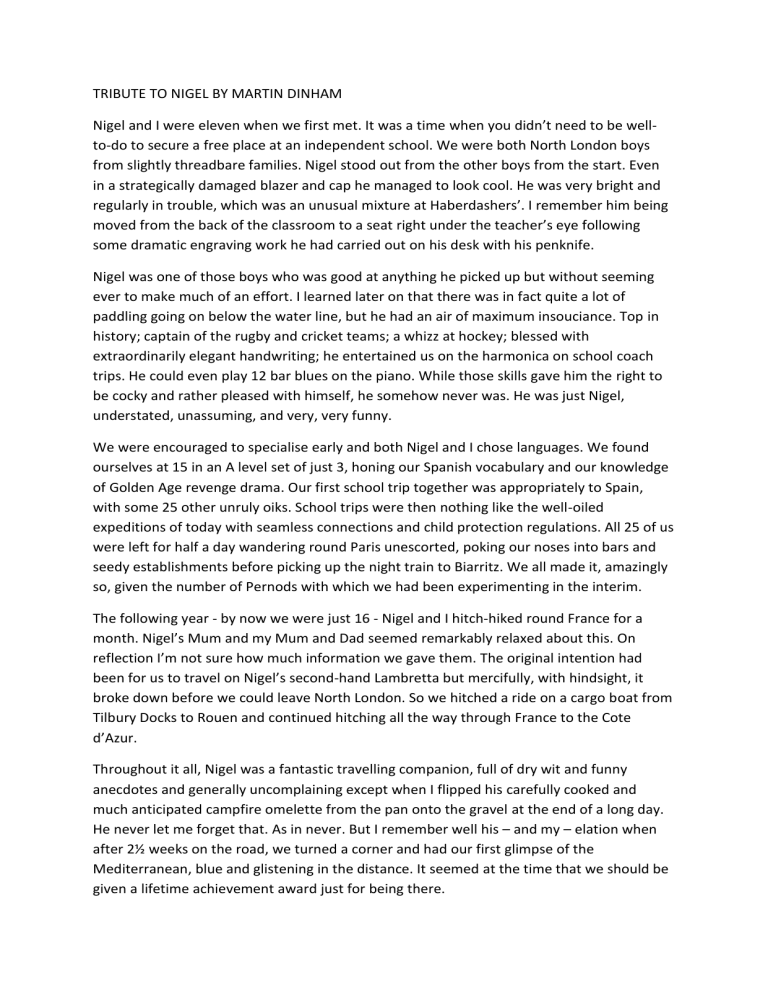
TRIBUTE TO NIGEL BY MARTIN DINHAM
Nigel and I were eleven when we first met. It was a time when you didn’t need to be wellto-do to secure a free place at an independent school. We were both North London boys from slightly threadbare families. Nigel stood out from the other boys from the start. Even in a strategically damaged blazer and cap he managed to look cool. He was very bright and regularly in trouble, which was an unusual mixture at Haberdashers’. I remember him being moved from the back of the classroom to a seat right under the teacher’s eye following some dramatic engraving work he had carried out on his desk with his penknife.
Nigel was one of those boys who was good at anything he picked up but without seeming ever to make much of an effort. I learned later on that there was in fact quite a lot of paddling going on below the water line, but he had an air of maximum insouciance. Top in history; captain of the rugby and cricket teams; a whizz at hockey; blessed with extraordinarily elegant handwriting; he entertained us on the harmonica on school coach trips. He could even play 12 bar blues on the piano. While those skills gave him the right to be cocky and rather pleased with himself, he somehow never was. He was just Nigel, understated, unassuming, and very, very funny.
We were encouraged to specialise early and both Nigel and I chose languages. We found ourselves at 15 in an A level set of just 3, honing our Spanish vocabulary and our knowledge of Golden Age revenge drama. Our first school trip together was appropriately to Spain, with some 25 other unruly oiks. School trips were then nothing like the well-oiled expeditions of today with seamless connections and child protection regulations. All 25 of us were left for half a day wandering round Paris unescorted, poking our noses into bars and seedy establishments before picking up the night train to Biarritz. We all made it, amazingly so, given the number of Pernods with which we had been experimenting in the interim.
The following year - by now we were just 16 - Nigel and I hitch-hiked round France for a month. Nigel’s Mum and my Mum and Dad seemed remarkably relaxed about this. On reflection I’m not sure how much information we gave them. The original intention had been for us to travel on Nigel’s second-hand Lambretta but mercifully, with hindsight, it broke down before we could leave North London. So we hitched a ride on a cargo boat from
Tilbury Docks to Rouen and continued hitching all the way through France to the Cote d’Azur.
Throughout it all, Nigel was a fantastic travelling companion, full of dry wit and funny anecdotes and generally uncomplaining except when I flipped his carefully cooked and much anticipated campfire omelette from the pan onto the gravel at the end of a long day.
He never let me forget that. As in never. But I remember well his – and my – elation when after 2½ weeks on the road, we turned a corner and had our first glimpse of the
Mediterranean, blue and glistening in the distance. It seemed at the time that we should be given a lifetime achievement award just for being there.
When we left school, we had an 8 months’ gap before heading off to University, so we both entered the world of work. I worked at the timetable office at Euston station. Nigel secured a nicely paid job doing overtime as a kitchen porter at North Middlesex hospital. As luck would have it his two companions on washing up duties were both Spanish, speaking not a word of English between them. Over the next six months, while I learnt all the train times between Crewe and Shrewsbury, Nigel became fluent in Spanish. The idea that it was
Cambridge that put him on the road to becoming a world famous Hispanist was in fact an elaborate subterfuge. It is North Middlesex hospital that should have the plaque.
After University, Nigel and I pursued our different paths. We became husbands and fathers and our families became friends. Here we all are today. I admired from a distance his tenacity at dealing with the challenges and trials of academia in Cambridge, Canada and St
Andrews; and his success at securing sabbaticals in sunny climes with such finesse. He expressed polite surprise that I should willingly expose myself to the rigours of the civil service and of bomb-torn countries going pear-shaped. Despite often being on other sides of the globe, we kept in touch over all the years, through visits which Jannie and I paid on
Nigel and Gitta in Canada and Scotland; through pen and ink; and through email. I kept all his letters and I read them still, because they make me laugh. He saw humour in everything around him but was so dead-pan and self-deprecating about what he was doing that, if you knew no better, you wouldn’t guess that he was the hugely respected writer, lecturer & tutor that he clearly was.
Our friendship was a bit like a familiar old glove, found at the bottom of the drawer. We might not see each other for ages but when we did it just fitted like before, with no need for adjustment. Visits by parents’ friends are often a deadly commodity for one’s children, who tend to head out of the house at the very prospect. Not so with the Dennis’s – who were always favourite guests with our children, Nathaniel and Rachel, as much as with ourselves.
When Rachel took up Spanish at University, Nigel was just brilliant, sending her books, tips, advice: the kind of unpatronising support - witty, irreverent, full of fun – that was spot on and useful.
It’s hard to believe that this remarkable, talented, unassuming man is not going to be around for us to share any more. There’s going to be a huge gap in all our lives, for Gitta and
Chris and Mike above all. He’s left something special, though, which are those wonderful, warm and funny memories, the generous tales and anecdotes and witty imaginings, as his parting gift to us, to help us fill that gap. I’ll finish with just one of those memories, a small extract from an email he sent me a year or so ago. He was recounting a conversation with an unnamed but clearly intense Senior Lecturer of Latin American studies, from another
University. “He asked me” said Nigel, “in the context of my work on intermediality, if I did
‘digital culture’. That got a one-word answer. Then he wanted to know if I was a cultural anthropologist, a new historicist, a sociologist, a psychoanalyst or a post-structuralist. I told him that I was a horticulturalist, leaning to the "post" side of things. I don't think he was
entirely convinced by my reply. Then he asked where I thought modern languages would be in five, ten and fifteen years. I felt like saying I had left my crystal balls on the bus (where the dog had eaten them)”.
How we will miss him.
